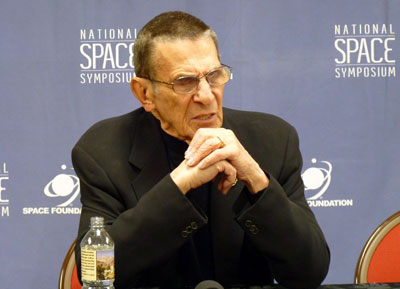Spock, NASA, and Obamaby Jeff Foust
|
| “I think [Apollo 11] had a great impact on the Star Trek reruns,” Nimoy said. “I think people began to look at Star Trek in a new and different way. There seemed to be a potential reality to what we were doing.” |
“We only did three seasons, which shocks a lot of people,” recounted Leonard Nimoy, who played Spock, during a brief press conference last Thursday at the National Space Symposium in Colorado Springs, where he was the featured after-dinner speaker that evening. “When we were done with that, I expected that we would have a couple of years of reruns, which would be typical, and then the show would gradually fade away.”
What changed the trajectory for Star Trek, he said, was the Apollo 11 landing in 1969, weeks after the final episode of the original series aired. “I think that had a great impact on the Star Trek reruns,” he said. “I think people began to look at Star Trek in a new and different way. There seemed to be a potential reality to what we were doing.”
“For whatever reason—that or other reasons—around 1970, ’71, instead of drifting away, the show became more and more popular in reruns, shockingly popular,” he recalled. “The show began to find a tremendous new audience.”
The rest, as they say, is history. As a demonstration of the popularity of both the show and of Nimoy in the space community, he received a standing ovation from an audience of aerospace executives, military officers, government officials, and others at the dinner that night—before he even started his speech. (He got another at the end.)
That speech focused primarily on his career and his experiences with Star Trek, including the origins of things like the Vulcan salute and the nerve pinch. However, at the earlier press conference, he discussed “real” space issues, including President Barack Obama’s speech earlier in the day about human space exploration.
“I’m not a politician,” Nimoy said. “I’m not really qualified to speak to the subject, except to say that I do believe that President Obama believes it when he says he is 100 percent interested in NASA and the space program.”
“I know that some people in Florida are going to be negatively affected by the plans,” he continued. “On the other hand, my mom used to say, ‘If you want to make an omelette, you have to break some eggs.’” He also noted that, in his speech, the president included funding for workforce initiatives to help those in Florida who will lose their jobs as the shuttle program ends.
| Nimoy on Obama: “I know for sure that he’s a Star Trek fan because when I met him for the first time three years ago he did this” and put up his hand in the iconic Vulcan salute. |
Nimoy called the idea of a human mission to Mars “wonderful” and agreed with the president that the Moon was no longer an exciting near-term destination for human spaceflight. “We’ve been to the Moon. I’m not sure what else we would accomplish by going back there again. I’m not sure about that,” he said, acknowledging that some scientists would find it useful. “But I think a Mars expedition would be very exciting.”
Nimoy, who attended the rollout of the space shuttle Enterprise (so named thanks to a write-in campaign by Star Trek fans) in 1976, said he was only now starting to think about the end of the shuttle program, with just three missions remaining on the manifest. “It was just suddenly today, as a result of the speech and all of the events that are happening now” that he said he was starting to think about it. “I knew it was being phased out, but it was on the periphery of my consciousness. And now, today, suddenly it became very real.”
“Maybe the shuttle has gone as far as it could and should,” he said. “I’m sure there are going to be a lot of people grieving; I will. I’ll be sad to see it go. It’s been a very important part of our image of NASA and space for the last 30 years.”
But why does he believe that the president is sincere when he says he supports NASA and human spaceflight? Nimoy had a simple explanation. “I know for sure that he’s a Star Trek fan because when I met him for the first time three years ago he did this” and put up his hand in the iconic Vulcan salute. “So that did it for me.”
“All in all, I’m looking forward,” he said of NASA’s new direction. “I’m hope it’s going to work out to the best.”
